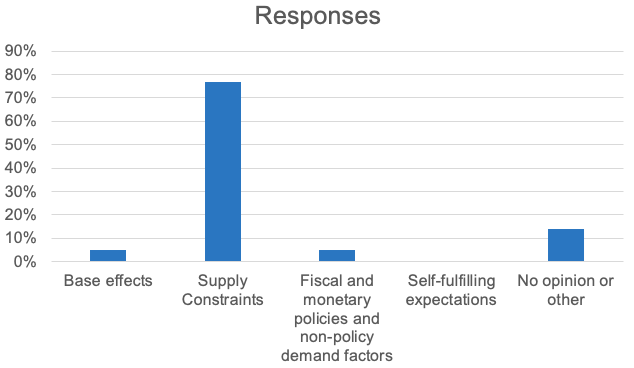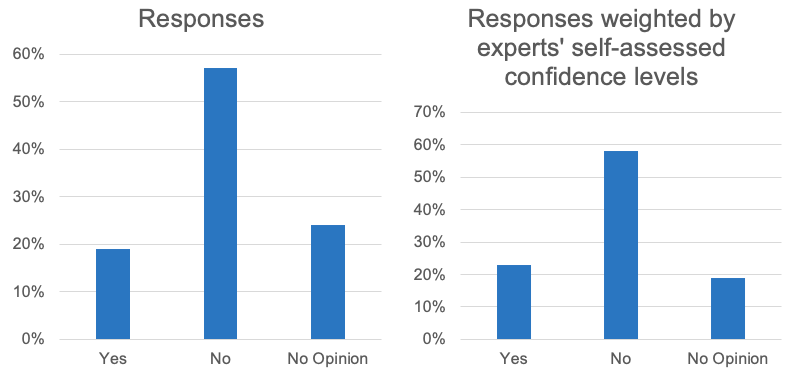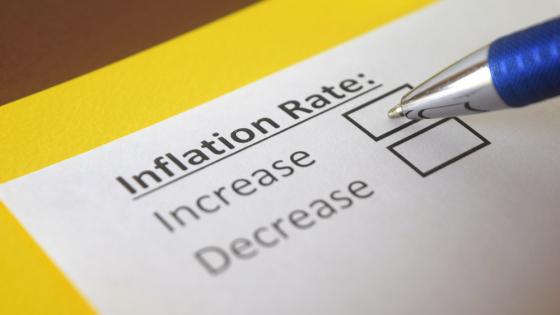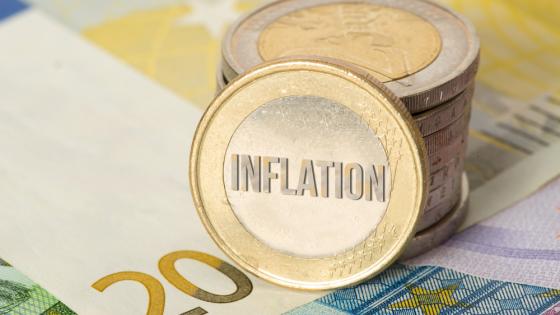Consumer prices in the UK rose by 5.4% (year-on-year) in December 2021, the highest annual rate of inflation recorded since the UK adopted an inflation target in 1992. This appears to be part of a global phenomenon, with US inflation at 7% and euro area inflation at 5%. These all are above the respective (official or unofficial) inflation targets of their areas. (Japan is an exception, with a year-on-year inflation rate of 0.8% in December 2021).
What caused this sudden rise in inflation? The most prosaic explanation is that this is merely due to base effects. Inflation was below target (0.8%) in 2020 and inflation in 2021 mostly compensated for this low rate. This is evinced by an annualised inflation rate of 3% over the past two years – roughly on target.
Other factors, however, go beyond a statistical blip. Commodity prices have also risen dramatically this year, and have passed through to rises in UK energy prices.1 Rising shipping costs have passed through to consumer prices as well.2 Supply chains have been strained, most notably in semiconductor shipments. Pandemic-driven demand for electronics have been hitting limited supply due to Covid-19 labour market disruptions. Semiconductors are key inputs to goods ranging from automobiles to toys, and have therefore translated to broader price increases. Leibovici and Dunn (2021) show that price increases in 2021 were far larger in industries with greater semiconductor dependence.
Supply chain disruptions were seen elsewhere, including a shortage of lorry drivers and abattoir workers in the UK (but also in other countries).3 Some have pointed to Brexit as a cause for labour shortages in these industries. Brexit has also increased costs for UK manufacturers due to the separate regulatory regimes in the UK and EU, and disruptions to EU-facing supply chains.4
These explanations are variants on ‘supply side’ pressures that have led to higher prices. Forbes et al. (2021) argue that such supply side factors are particularly important in generating inflation because the Phillips curve is non-linear.5 Goodhart and Pradhan (2021) propose that current inflation may be part of a reversal of longer-term trends that have led to low inflation in the past few decades.
Others have emphasised demand side forces, including monetary and fiscal policy. Larry Summers estimated in his Washington Post column of February last year that US fiscal measures were three times larger than the output gap, risking inflation.6 Summers warns that the US Federal Reserve’s complacency on price increases may have added fuel to the fire. Other prominent voices warning that fiscal policy may have led to inflationary pressures include former chair of the Council of Economic Advisors, Jason Furman, and former IMF chief economist, Olivier Blanchard.7 Both point to other inflationary pressures as well. Summers and Paul Krugman debated this question in February, with Krugman positing that inflationary concerns were overstated.8 When they revisited this discussion in a recent forum, Krugman acknowledged being excessively sanguine on inflation, but defended his earlier view that fiscal policy wasn’t the primary cause.9
Some drivers of inflation, such as supply-chain disruptions, are likely to dissipate as Covid-19 moves from pandemic to endemic. However, short-lived inflation could become endemic itself if it leads to higher inflation expectations. These expectations may become self-fulfilling and lead to persistent inflation. Gerard Lyons warns in The Guardian that the Bank of England may be responding too late to the inflation surge, which risks becoming persistent.10 There are some indications of rising inflation expectations. UK inflation protected gilts imply that the market expects inflation to exceed the Bank of England’s in the upcoming decade. (The gilts are indexed to RPI, which tends to rise one percentage point faster than the CPI, but implied RPI expectations are above 3% for more than ten years.) While the implied increase is moderate, always below 4%, Reis (2021) warns that looking at average inflation expectations may understate inflation risks. A look at the full distribution of (US) inflation expectations in household and corporate surveys shows a substantial share of respondents expecting far higher inflation. Caballero and Simsek (2021) analyse how a central bank should respond to temporary supply contractions in a dynamic New Keynesian model with demand inertia, and conclude that policy should frontload interest rate hikes to prevent entrenched inflation.
A debate has emerged in this context about how persistent inflation will be in the coming years. This month’s survey asks the CfM panel of experts on the UK economy to evaluate the causes of currently high inflation and disclose whether they expect it to persist.
The first question asks what the primary reason is for rising UK inflation in 2021. The options were consolidated under several major categories, but panellists were asked to comment on the causes more specifically.
Question 1: Which of the following factors is the primary reason for the rise in inflation in 2021?
Twenty-one panel members answered this question: 77% of the panel thinks supply constraints were the main culprit for rising inflation rates, with individual dissenters choosing “base effects” or “fiscal and monetary policies” as the main causes.
Alessandra Bonfiglioli (Queen Mary University of London) summarises the consensus view: “The supply-chain crisis affecting most rich countries, as well as the surge in energy prices in the whole of Europe, has certainly played a prominent role. In the case of the UK this was aggravated by the increase in import costs and the shortages of workers from the EU, many of which had returned to their home countries during the lockdowns and were unable/unwilling to come back due to visa issues.” James Smith (Resolution Foundation) concurs: “The biggest driver of inflation at the moment are conditions in global goods markets. In turn, the key driver there has been the normalisation in commodity prices. Issues in global supply chains have exacerbated this.”
The global and supply-side causes for UK inflation left the panel relatively sanguine about longer run inflation and the accommodative policy stance. David Cobham (Heriott Watt University) notes that “inflation expectations [are] not seriously unanchored (so far) and fiscal-monetary policies time-limited.” In a similar spirit, Simon Wren-Lewis (Oxford University) thinks that “we can eliminate excess demand as a cause … As UK output remains well below its pre-pandemic trend … There is no sign of higher persistent wage inflation, so equally this has nothing to do with generalised pressure from the labour market (and higher expectations).” Richard Portes (London Business School and CEPR) adds that “price increases [are] very heterogeneous across product categories,” which indicates that this has more to do with specific shocks than policy, and that “wage rises [are] also very heterogeneous.” Portes concludes that this leaves him on “team transitory,” among the economists who believe that current inflation will soon pass.
This brings us to the second question, which asked panellists whether they believe that inflation will be persistent. To minimise ambiguity, we defined “persistent” inflation for the sake of this question as remaining above 4% for the year 2023 (December 2023 relative to December 2022). Of course, panellists’ answers may have been contingent on how the Bank of England will respond, and their predictions are meant to reflect a joint prediction of the underlying price pressures and the Bank’s response to them.
Question 2: Will the inflation surge of 2021 prove persistent?
Twenty-one panel members responded to this question. A solid majority of 57% thinks the inflation surge will subside by 2023, compared to only 19% expecting longer-lived inflation. This is consistent with the findings of Andre et al. (2021), who observe that households and businesses expect inflation to be more persistent than experts.
Explaining why inflation will be transitory, panellists predicted that supply side pressures would ease by 2023. Wendy Carlin (University College London) summarises that “on the supply side some of the global factors exacerbating inflationary pressure will likely ease.” She also points to weak demand forces going forward that would bring back the deflationary concerns of the pre-Covid economy: “On the aggregate demand side, deflationary forces from the fiscal and monetary sides combined with the squeeze on living standards dampening consumption of lower- and middle-income households will act to reduce inflation.”
Others reminded readers that inflation is largely a policy choice of the Bank of England. Francesca Monti (Université catholique de Louvain) is uncertain whether inflation will be persistent, and writes: “I don’t think that this inflation is ‘transitory’ in the sense that it will die out by itself without policy action. It is not persistent either, because monetary policymakers however have the tools to bring inflation down, but at the cost of a potentially very painful slowdown for the economy.” Panellist had differing predictions on whether the Bank of England would respond sufficiently to keep inflation low in the near future. Wouter den Haan (London School of Economics) concurs, but expects and hopes that “the BoE realises that long-term credibility is at risk if they do not take action to fight persistent inflation and that the cost of losing this credibility is costlier than any short-term advantages of loose monetary policy.” Michael Wickens (Cardiff Business School and University of York) is less sanguine. He believes inflation will be persistent because it will be accommodated by monetary policy. Instead, he believes that “Monetary policy should instead just accommodate the first-round effects.”
References
Andre, P, I Haaland, C Roth and J Wohlfart (2021), “Inflation Narratives”, VoxEU.org, 23 December.
Ball, L, G Gopinath, D Leigh, P Mishra and A Spilimbergo (2021), “US inflation: Set for take-off?” VoxEU.org, 07 May.
Caballero, R J and A Simsek (2021), “A Note on Temporary Supply Shocks with Aggregate Demand Inertia”, working paper.
Forbes, K, J Gagnon and C G Collins (2021), “Pandemic inflation and nonlinear, global Phillips curves”, VoxEU.org, 21 December.
Jongrim, H, M A Kose and F Ohnsorge (2021), “Inflationary pressures: Likely temporary but challenging for policy design”, VoxEU.org, 14 July.
Goodhart, C and M Pradhan (2021), “What may happen when central banks wake up to more persistent inflation?”, VoxEU.org, 25 October.
Leibovici, F and J Dunn (2021), “Supply Chain Bottlenecks and Inflation: The Role of Semiconductors”, Economic Synopses, No. 28.
Reis, R (2021), “Losing the Inflation Anchor”, Brookings Papers on Economic Activity, Fall 2021.
Endnotes
1 https://www.independent.co.uk/news/uk/home-news/energy-prices-going-up-why-b2007546.html
2 https://obr.uk/efo/economic-and-fiscal-outlook-october-2021/
3 For lorry drivers, see https://www.bbc.co.uk/news/business-59542794; for abattoir workers, see https://www.bbc.co.uk/news/science-environment-58749841.
4 https://www.theguardian.com/business/2022/jan/10/brexit-changes-will-add-to-soaring-costs-in-2022-warn-uk-manufacturers
5 https://www.theguardian.com/business/2022/jan/10/brexit-changes-will-add-to-soaring-costs-in-2022-warn-uk-manufacturers
6 https://www.washingtonpost.com/opinions/2021/02/04/larry-summers-biden-covid-stimulus/
7 For Furman, see https://www.project-syndicate.org/commentary/2021-us-inflation-forecasting-errors-economic-models-by-jason-furman-2022-01?barrier=accesspaylog; for Blanchard, see https://www.piie.com/blogs/realtime-economic-issues-watch/us-inflation-running-high-what-should-we-worry-about-now
9 https://bcf.princeton.edu/events/a-conversation-with-paul-krugman-and-lawrence-h-summers/
9 https://www.youtube.com/watch?v=IqkR0ODHie4
10 https://www.theguardian.com/business/2021/dec/30/the-bank-of-england-has-underestimated-the-risk-inflation-poses-to-stability






